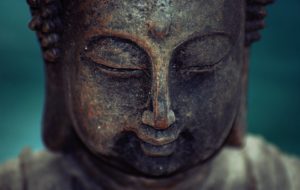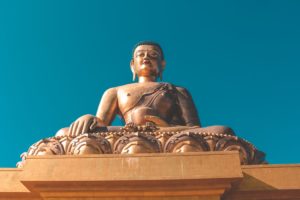Wisdom is the truth of God being lived rightly from his love.
The wisdom of Zen is one way to do this.
This wisdom is slowly accumulated from our understanding that is being gained from our consciousness becoming more aware of the inherent meaning of things that relate to love. All things relate in a way to God’s love that then reveals love’s truths to us, when that love is being wisely applied.
Living truth is living the wisdom of love.
Zen wisdom does not come from our thinking. It comes from that flash of insight that breaks past all thought and reaches into a deeper understanding in a way that becomes a new knowing of yet one more truth being revealed.
No amount of wisdom can be obtained by a resistant person, but a non-resistant mind absorbs all truth, and can never be overcome by anything that the world, or anyone else, ever pits against it.
In Zen, it is said that when a man becomes a sage though the understanding of wisdom, he returns to being a normal and ordinary man, once more again.
The wise are not wise within themselves, but wise because they do not try to be wise.
Zen wisdom is full of such contradictions. Duality conflicting against itself causes love to be rubbed up against itself, and the resulting friction can result in another truth being mined from love’s depths.
The understanding of such truths builds wisdom.
Zen wisdom describes things as being just as they are, whether we understand this yet to be so or not. If we could fully accept things just as they are, wisdom would live in us without us even searching for it. Wisdom flows unconsciously in us at all times, consciously we know this, when we become enlightened.
 Zen’s wisdom is often captured in a Zen teaching parable. They are usually fairly short in length, and make a particular point, by showing the reader a certain aspect of a Zen truth.
Zen’s wisdom is often captured in a Zen teaching parable. They are usually fairly short in length, and make a particular point, by showing the reader a certain aspect of a Zen truth.
Here is an example of such a parable. It contains truth, and its wisdom can be seen from many different levels.
There was once a renowned philosopher and a scholar who had devoted himself to the study of Zen for well over thirty years. One day, he realized that he had finally attained enlightenment. Immediately, he took all of his books out into his yard and burned them all in a giant bonfire.
He had literally thousands of books, and he destroyed them all.
A passing Zen master, seeing this going on, stopped to make a brief comment.
” You have burnt your mind, but what did you find? ”
was all that he said.
The Zen master was pointing out to this scholar that he really still had his mind. He had missed the point of real enlightenment, to parade himself before others with this trick of the mind, by trying to show everybody that he was not still attached to his books anymore.
We do not become enlightened by trying to destroy something. The mind of no-mind is still the mind. It has not been destroyed or hidden away anywhere. Our mind must be kept, but without minding it, or thinking that it is minding us. Our mind is our heart’s tool, we are not only just our mind.
The Zen master is making the point here then, that burning books is still attachment, but in the reverse.
The scholar is attached to the idea of non-attachment. This professor will eventually go back to his books again, to search again for what he hasn’t really yet found. He must not try to find it by just learning about it, but by being it.
The subtle truth being alluded to here then, and which is indirectly being referred to in this story, is that enlightenment is not to be found in books. We create our own enlightenment when we are ready to live from it.
Love is not contained in books as love, but as the truth of love is written down in a form that is not really loving, but just remains only ever its description. Like eating an apple, loving is loving, and not just reading about it.
We cannot become wise about apples unless we actually begin to really eat them.
This is why we must go through experiences with love, in order to bring us practical and real understanding, which then builds in us as divine wisdom, and finally leads or more allows us to be fully enlightened in knowing love’s truths.
We then know truth from our heart and are not trying anymore to just hold this truth within our minds
At this stage though, we will also know that there was never a time when we were not already enlightened.
” Not only do you create the way you look at things, but you also create the things you look at!”
This is a quote from Lazaris, who is an entity, apparently being channeled by a man called Jach Pursel.
Is this true, what he is saying here? Are we really creating everything like this, or are we only really more sustaining them, in our own part of God’s oneness somehow?
Creation doesn’t really exist within God’s oneness, unless we are the ones creating it for our self, to separately exist. What Lazaris means, is that when you stop creating, by seeing this world as being real, you finally see past creation, to seeing God being you, within God.
God is all in all in his oneness.
This is what the wisdom of Zen is always trying to show us.
Another way that Zen demonstrates the wisdom to us is within its koans.
” What is the sound of one hand clapping? ”
is one such, very well known Zen koan.
The one hand clapping is never clapping with our own mind, it fact it was never ever clapping at all.
I will leave you with this question then to ponder over.
 Am I talking here about our mind clapping, or the hand of God clapping? Was it the one hand that was never clapping at all, or was it our mind that was never clapping?
Am I talking here about our mind clapping, or the hand of God clapping? Was it the one hand that was never clapping at all, or was it our mind that was never clapping?
When we start clapping with our own hearts, God’s heart will be clapping within us then too. We will be enlightened as we now know, that God’s heart does all the clapping, and that it has never stopped clapping within us. When we try to clap with our imaginary one hand for only just our self, we stop hearing the clapping of God’s hand, within us.
We make too much noise inside our minds, to hear God talking to us.
When we stop trying to hear God clapping with our minds, we clap hands together with God in our hearts. The sound of one hand clapping, is us clapping the hand of God, and then seeing that the other hand, our own hand, has never really separately existed.
We are God within God, being us.





